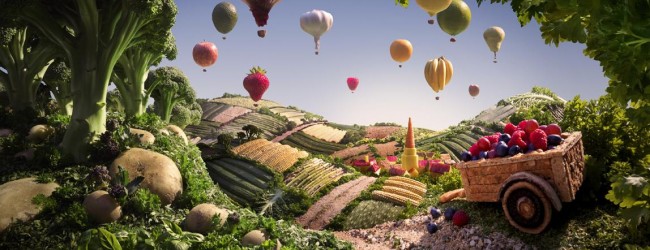
By: Saher Hasnain
The sustainability, health and ethics of the global food system are an increasingly relevant topic of research and policy. Changes in the world’s food system have been incredibly dramatic in the past few decades, impacting producers, consumers, institutions, governments and the greater environment. While this food system provides for over 7 billion people, a significant proportion of the world’s population is improperly nourished, and the land, environment, and organisms are damaged through drastic land use change, deforestation, pollution and loss of biodiversity. In light of these impacts of our food choices, ‘sustainable diets’, ‘global food systems’ and ‘sustainable food security,’ are vital concepts in a world threatened by climate change.
Food sciences, food geographies and environmental sciences (in themselves, applied sciences), involve the active collaboration of engineering, and the physical and biological sciences. Moving beyond the introductory questions of production, consumption and appreciation of food, studies of food critically examine issues of environment, identity, justice and economy of food. However, most discussions of religion and food are confined to religious injunctions of permissible/impermissible foods and the food habits and traditional cuisines of religio-cultural groups. While these are very important, particularly in a rapidly globalizing community, this narrow focus side-steps the significant potential that religions like Islam have to offer for improving the food system.
The food system in its current form appears to have evolved primarily in a reactive manner, driven by demand and conforming to the ideals of the modern commodity-driven world. The stark contrasts of immense tracts of intensively farmed crops and animals, resulting in surgically clean and impersonal packages of food and the small, personalized gardens and co-op farms with their intimate relationship to food, exist in the same world and at the same time. Although we are recognizing the dangers of intensive agriculture to our health and the environment, it is still needed to provide a greater proportion of the world’s population, with the basic food energy required for the sustenance of life. The weaknesses in distribution networks, the geographically imposed boundaries for food production, still require that the perceived ideal of the locally grown food products are economically beyond the reach of most people. While research and innovation continues, for a variety of reasons, the current troublesome form of the latest food system must continue until a cleaner, more efficient and dynamic alternative is found.
Islam, like many other religions, offers a number of guidelines pertinent to food. Muslims have been encouraged to ‘eat of the good things’ (Quran 2:172) provided to them. Permissible/impermissible foods are frequently discussed in scholarly literature, and can be a prime source of concern when living in non-Muslim countries. However, expanding the field of interest to environment and ethics, Islam can provide a greater number of guidelines that can be applied to the food system. Ethically aware and sustainable food companies already emphasize similar ideals, by sourcing responsibly and by ‘putting a face’ on their products. Entrepreneurial endeavors are engaging with food at every step, now notably by tackling food waste, redefining what classifies as ‘waste’ and enjoining people to consume mindfully. Muslim communities will do well to apply such ideals to their food systems and force the discussion beyond issues of the halaal/haraam dichotomy and consider healthy, ethical and sustainable diets.
Scientific innovation for the food system mostly targets intensification (with the best of intentions in most cases), resilience and safety. We want the most of the best food, with the least resources input, to be distributed as quickly as possible, while remaining as safe as possible. Compromises have been made in this process, with disastrous consequences. The advent of the ‘broiler chicken’, public concerns over GMO crops, manure flood disasters, resistant pests and waterlogged lands are common sights in our foodscapes. In parallel, technological innovations like no-till farming, pest-resistant crops, fertilizer improvements and vertical farming are increasingly common as well. However, like most innovations in history, while the idea may be touted as a stroke of brilliance, actual implementation is met with problems of finances and strong resistance over many fronts: resistance over changing deeply ingrained activities, resistance over the potential loss of revenue, and resistance over the potential of failure. Innovation is always challenged, but often worked through, as can be seen through the successes of the food system.
Optimistically speaking, the opportunities in this system are boundless. Enterprising individuals across the world are working through solutions, resulting in advancements like highly productive home-window farms, bringing hydroponics to the average consumer, improving kitchen gardening, and many others. Communication, collaboration and the potential of connecting with experts, entrepreneurs, financial backers, producers and consumers from every corner of the world, are the biggest strengths at our disposal to drive innovation in science. The expertise and confidence contained in the Muslim world is staggering; seen in the research produced in their institutions and the risks and chances taken by their individuals to improve their communities.
The global food system is a behemoth that connects every single human being on this planet. There are few human constructions that can boast of such an achievement. Each decision made on where one shops for food, what diet they follow and what happens to the smallest scrap of food waste, has an effect on this system. The Muslim world has the opportunity to shoulder some of the responsibility to ensure that it functions to the best of its ability, for the good of the planet and all of mankind. And when it comes to matters of everyday essentials, of something as intimately relevant and viscerally profound as food, no challenge is too big, or, opportunity too small.
You must be logged in to post a comment.